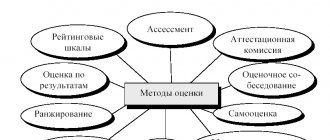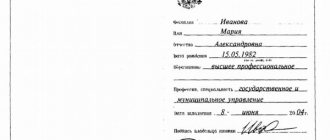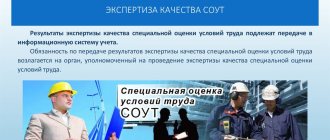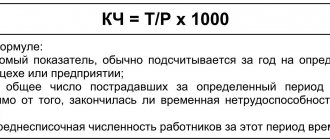Home / Labor Law / Employment / Hiring
Back
Published: 07/11/2016
Reading time: 7 min
0
1720
Candidate assessment is a complex system of actions aimed at determining the level of qualifications and quality of work of potential employees.
In this article, we will take a closer look at the most popular methods and techniques that are used to evaluate candidates for employment.
- Algorithm of actions
- Basic Testing Methods General Aptitude Tests
- Aptitude tests
- Personality tests
- Biographical tests and biographical studies
Necessary evaluation criteria
To achieve effective personnel selection, it is necessary to use only those methods that meet the following criteria:
- objectivity – do not depend on private opinion and personal judgments;
- reliability – assess the real level of required skills;
- reliability – not influenced by situational factors: weather, poor health, etc.;
- comprehensiveness – they take into account not only the candidate’s suitability for the vacant position, but also the opportunities that the company can provide for realizing his potential, further development and career growth;
- predictability – identify the applicant’s capabilities;
- understandability – the assessment process and its results should be understandable to both those conducting the selection and the candidate for the position.
How are you assessed at an interview?
We will offer basic questions as an example. So, determination – how to check it during an interview with a candidate:
- do you know how to overcome difficulties;
- what will be your decision when obstacles arise: don’t pay attention, continue to act and achieve results, retreat;
- can you withstand a large number of failures;
- what you failed to achieve in life and what are the reasons.
Responsibility assessment:
- can you take responsibility for defeats, problems and failures;
- will you accept help from a stranger;
- did you help anyone, when did it happen, how did it manifest itself;
- did your work result influence the success of the company and its employees and how did it influence it.
Entrepreneurship Assessment:
- can you emerge victorious from a difficult situation;
- will you take action in unfavorable situations;
- what obstacles, difficulties, problems you had to face in your previous position and how you solved them;
- How did you manage to get your previous job?
Assessing the candidate's independence:
- when did you earn your first salary;
- where did you spend the money;
- how long have you lived separately from your parents;
- How long have you been living on your earnings?
Stress resistance assessment:
- Are you able to make a decision in a situation where there is a panicky lack of time, uncertainty appears, and pressure is exerted;
- what conditions should the company provide you for successful work;
- Are there any conditions under which you can quit and give examples.
Assessment of the applicant's organizational abilities:
- how do you monitor your wards;
- how do you distribute the responsibilities of workers;
- what mistakes do you fine for, what achievements do you reward.
Assessment of tactical and strategic planning:
- whether you can carry out several tasks at the same time;
- how do you plan your day, time to work;
- how many ways to solve a particular problem do you usually have;
- can you describe what you planned a year ago that was not achieved;
- who is involved in drawing up your plans;
- what do you know about time management?
Assessment :
- have you ever been appointed a prefect;
- Do you have the ability to influence others?
- what main qualities do employees value in you?
- Do you value your boss and for what qualities;
- three of your negative qualities that are noted by your colleagues.
How to test systematic thinking during an interview with a candidate:
- Have there been any difficult situations in your life and how did you find a way out?
- you acted intuitively;
- did you have any options for solutions?
- Have you thought about the reasons that caused this situation?
How to assess moral values during an interview:
- what do you think might motivate an employee to quit;
- what motivates a person to work;
- why it is worth firing an employee immediately;
- What do you think, is lying justified, and in what cases?
Important: questions may vary. It all depends on the company and the position for which the applicant is applying.
Assessment steps
Typically, the assessment of candidates for employment takes place in several stages:
- Preliminary selection conversation.
- Questioning.
- Interviewing.
- Testing.
- Verification of educational background, work history and references.
- Medical checkup.
- Decision-making.
It is not always necessary to go through all the stages. The first three are basic and may be sufficient to make a decision about the candidate’s suitability for the vacant position. The rest can be used if necessary. Let's take a closer look at each of the stages.
Preliminary selection conversation
The first stage is actually getting to know the applicant for the position. This is an opportunity to form a general opinion about the candidate, evaluate his appearance, level of education and intelligence, and basic personal qualities.
A preliminary conversation can be conducted by a human resources specialist or a line manager at the future place of work. Depending on the employer’s preferences and the conditions of future work, you can interview each applicant separately or all at the same time.
In the second case, a competitive component is introduced into the process.
Questioning
After successfully completing the first stage, the applicant is asked to fill out a questionnaire that contains questions selected by the employer. It is important to remember that the questionnaire cannot contain questions about political and religious views, as well as race and nationality.
The questionnaire most often consists of the following blocks:
- general information about the applicant;
- information about basic and additional education;
- information about previous places of work;
- professional skills of the candidate;
- employee motivation and work goals;
- additional information (for example, health status, interests and hobbies).
Interviewing
An interview or interview is the main stage in assessing candidates. Most employers make decisions about hiring or refusing to hire based on the results of the conversation.
All interviews can be divided into three types:
- structured – carried out according to a certain pre-prepared scheme, do not consider the possibility of an individual approach to the candidate;
- poorly formalized - only basic questions are prepared in advance, the interview is more flexible and allows you to ask additional and situational questions;
- unstructured - only topics that need to be touched upon during the conversation are prepared in advance; allows you to find out the greatest amount of information about the applicant. Suitable for experienced interviewers.
Testing
Conducting tests helps the employer evaluate the professional and personal qualities of the applicant, determine his potential and specific motivation. Employment tests can be divided into several types:
- professional;
- psychological or personal;
- intellectual;
- mathematical;
- brain teaser;
- verbal.
Verification of educational background, work history and references
The employer, at its discretion, may check the information about work experience and education provided by the applicant for the vacant position. As well as recommendations provided by the applicant.
A conversation with the candidate’s previous employers will help you find out his specific successes and achievements at previous places of work, his competence and ability to adapt to the team.
Medical checkup
If the working conditions require special health requirements, the candidate will need to undergo a medical examination. For example, if the work involves food or physical activity.
Decision-making
Based on the results of the previous stages, the employer decides to hire the applicant.
Basic methods
There are a large number of assessment methods, the choice of which depends on the goal that the organization sets for itself.
Testing
General Aptitude Tests
They include various tests that determine the level of development of general abilities, such as the ability to think logically, a general understanding of the world, and memory. They are mainly used to assess learning ability.
Aptitude tests
The employee is given a test to check his suitability for a specific activity. To do this, the test is designed in such a way that they are similar to the work of the employee or candidate.
Personality tests
Short or long psychological tests of various types. These can be questionnaires of interpersonal relationships, self-attitude, psychological well-being, emotional characteristics and many others.
Biographical tests and biographical studies
Most often, this method is used to evaluate employees of banks, security agencies and internal affairs.
An individual dossier is prepared for the candidate. It differs from a personal card or file in that it contains data about personal connections, penchant for alcohol and gambling, manifestations of envy, conceit and other qualities.
Interview
A method for assessing the knowledge, experience and professional qualities of an employee (candidate) during a personal conversation with him. Due to the fairly widespread use of the method, several types of interviews should be distinguished:
- structured. The most common type, which involves a question-answer format based on a pre-prepared list of questions;
- unstructured. Conducting a conversation without a pre-planned plan;
- provocative. Checking the candidate’s reaction to job refusal;
- case interview (situational). Assessment of sociability and general intelligence;
- brainteaser. An interview in which the candidate is required to solve a complex problem using logic;
- stressful. An employee or candidate is asked unexpected questions or an unpredictable environment is created (the sound of a fire siren, etc.).
Recommendations
From the letters of recommendation that the candidate provides, as well as from conversations with the people listed there, you can find out how he coped with his functions at previous jobs.
It is best to ask for recommendations not for your last job, but if a year or more has passed since your dismissal, since there is a risk of getting an overly biased and emotional opinion about the candidate.
Large companies have a number of requirements for the preparation of letters of recommendation: they must be on behalf of the head of the organization, printed on a special company letterhead with all contact information.
The main condition of this method is the availability of coordinates to verify the accuracy of the information. It is one of the least effective methods.
Unconventional methods
- Polygraph (lie detector) study. It is used mainly for persons of certain professions who deal with inventory items - cashiers, trade workers, bank employees;
- alcohol or drug tests. They are part of the mandatory medical examination for certain professions (transport drivers, security guards);
- psychoanalysis;
- astrology. Some organizations require candidates based on their zodiac sign.
Personnel Assessment Center (PAC) method
Carrying out comprehensive measures to assess employees’ performance of typical tasks for a specific (current or potential) position in order to identify certain qualities of those tested. These could be business games, interviews, various types of testing.
The central processing center can solve two problems:
- Evaluate an employee (current or potential) and determine his career opportunities.
- Conduct training and education for management staff.
It is the most objective and effective method, since it uses several methods by several appraisers, therefore it is quite expensive and is used mainly for assessing management personnel.
Is the bonus included in the calculation of holiday pay? You can find out by reading our article. Find out how to properly fire a pensioner by reading our article. A sample voluntary resignation letter can be found here.
Basic methods for assessing candidates
Methods for assessing candidates for employment can be classified into three main groups:
- Predictive - the use of personal data, written and oral characteristics, opinions of previous employers and work colleagues, testing and personal interviews.
- Simulation – the applicant’s solution of theoretical problems or situations.
- Practical – making a decision about the applicant’s suitability based on the results of his practical work.
The most effective method of personnel assessment is Assessment-center. It allows you to obtain reliable and complete information about the personal and professional qualities of the applicant.
Let’s take a closer look at what employment assessment is and how its high efficiency is achieved.
The essence of the method is that candidates undergo a set of tests, during which several expert observers can assess the professional and personal qualities of the applicants and the degree of their suitability for the job. Effectiveness is achieved through the use of different types of exercises, a variety of techniques and procedures, group interactions, and the use of multiple observers.
The assessment center consists of the following components:
- biographical questionnaire;
- interview with an expert;
- short presentation of the participant;
- various tests;
- business games;
- individual solutions to specific situations;
- description of professional achievements;
- expert observation.
Depending on its needs, each company chooses the composition and sequence of the necessary components.
Assessment is a costly method of personnel assessment, therefore, despite its effectiveness, it is rarely used by employers.
Biography Study
Business assessment of candidates for employment is carried out by studying their personal qualities based on biographical analysis. The following facts are taken into account:
- Repeated changes in work activity in a short period of time. If the applicant has changed jobs several times over the course of six months, this indicates that he will not work in this position for long. Based on this, the choice will fall on a more permanent employee.
- Reasons for leaving your previous place of employment. In this case, dismissal at one’s own request or at the request of management plays an important role. If leaving work was prompted by a request from your superiors, then the fact of the reason is important. It often happens that a person himself is not inclined to coordinated teamwork, is aggressive and susceptible to external factors. Such an employee will not be suitable for a company in which collective work activity is a priority.
Non-traditional methods of assessing applicants
When assessing personnel, some recruiters and employers, along with basic methods, also use non-traditional ones, such as:
- physiognomy – determination of personality type based on facial features and body features;
- graphology – description of personal characteristics based on handwriting analysis;
- astrology – the study of personal qualities according to the signs of the Zodiac;
- Palmistry is the determination of character traits based on the shape and relief of the palms and fingers.
These methods are quite subjective, and therefore are not very popular.
Case interview
Testing employees with this method of assessing professional qualities allows you to find out much more information about a person and draw appropriate conclusions.
How to evaluate an applicant:
- Applicants are given cards describing a specific situation related to the work being provided.
- This is followed by a request to express how a person would act in a specific situation.
Eg:
I received a call from an angry customer whose product was not delivered on time. The documentation was completed by an employee who was not at work for this period of time. The essence of the question is this: it is required to state as clearly and competently as possible the required actions to help solve this problem.
The received answer reveals the applicant’s business qualities and model of behavior in a non-standard environment:
- speed of reaction;
- stress resistance;
- ability to resolve conflict situations;
- reliability.
- Passing a medical examination when hiring according to the Labor Code of the Russian Federation
Employee testing is also possible using logic puzzles.
This method identifies an applicant with the ability to think outside the box and find a solution to a problem in the shortest possible time.
Valuation Cost Analysis
Personnel assessment when hiring requires certain costs from the enterprise. Their size depends on what techniques the recruiter uses.
Conducting an interview and filling out a questionnaire are the least expensive - they require the employee responsible for personnel selection to have free time. They can be used to pre-screen unsuitable candidates. And sometimes only these methods may be enough to make a decision.
Testing requires more investment in the development of tests and the organization of their implementation. The most costly and effective at the same time is the Assessment Center.
Non-standard technique
Such methods are used by organizations with specific professions. For example, intelligence officers. Organization of business assessment of personnel in this case occurs with the help of:
- lie detector;
- drug and alcohol testing;
- psychological testing.
Sometimes when choosing applicants, the following fact is also important:
- appearance;
- voice timbre;
- the ability to present oneself.
This applies more to management positions and employees involved in advertising, presentations, contracts and agreements.
Candidate's documents
The employee is required to provide the following documents to the company:
- identification card - usually a passport;
- identification code;
- work book - unless the employee is employed for the first time or is employed part-time;
- certificate of state pension insurance - if not getting a job for the first time;
- military registration documents - if subject to military conscription.
If the position requires special qualities and skills, the employer may, at its own discretion, expand the list of documents, for example, include a certificate of higher education or medical certificates.
In this case, the documents should indicate only the professional qualities of the employee, which are important in his future activities, and not, for example, his religious views or political beliefs.
Back to contents









